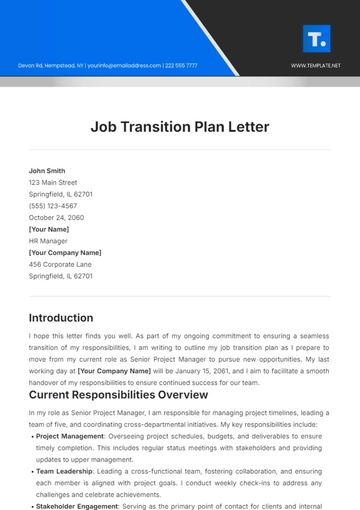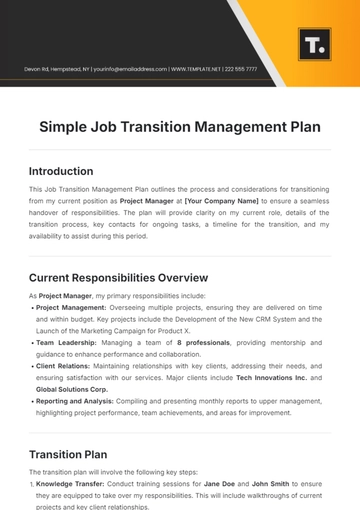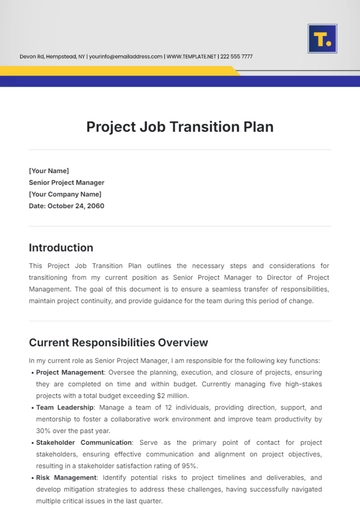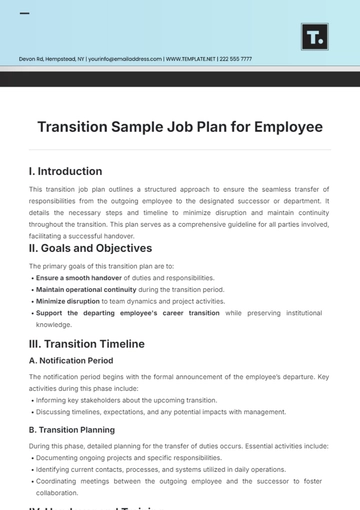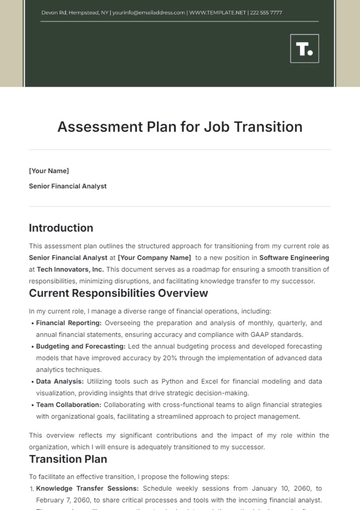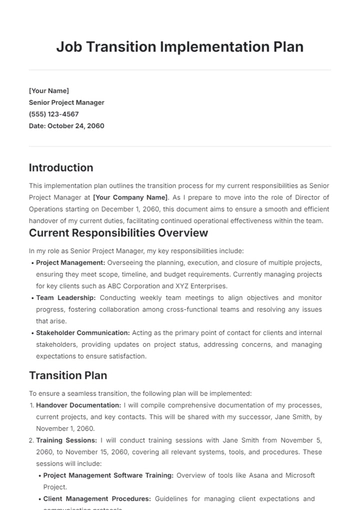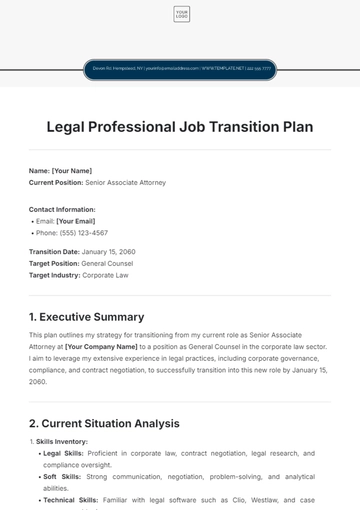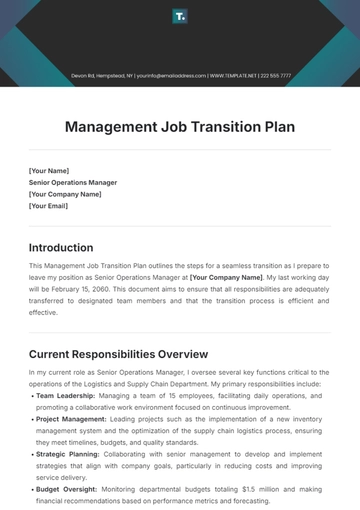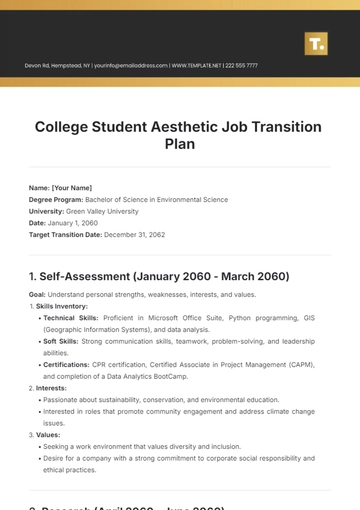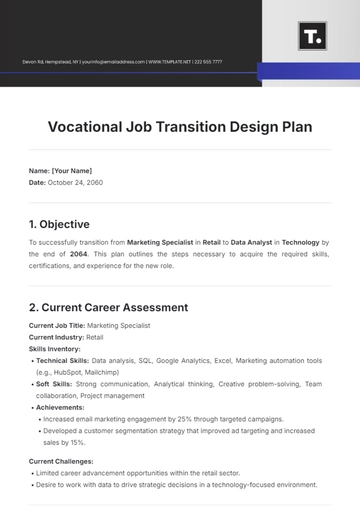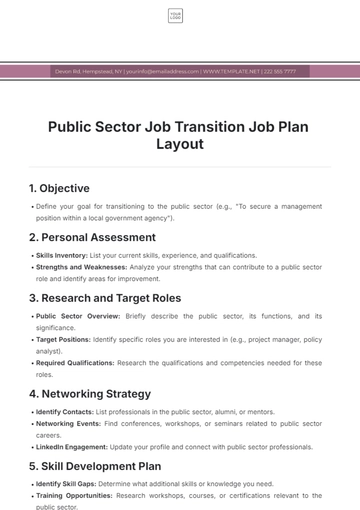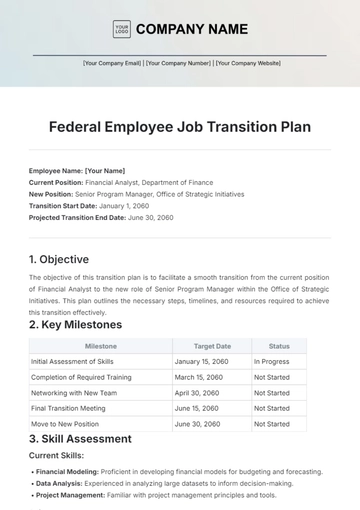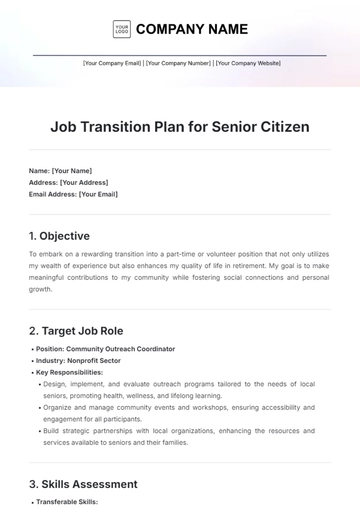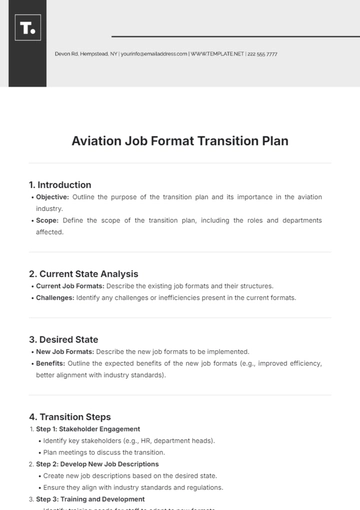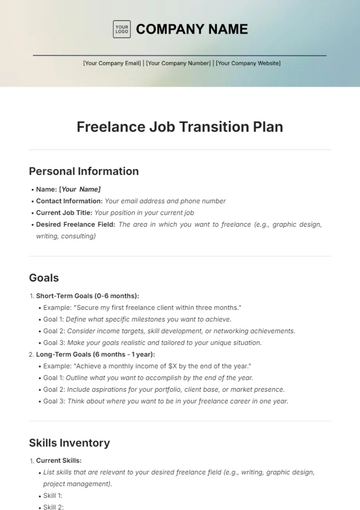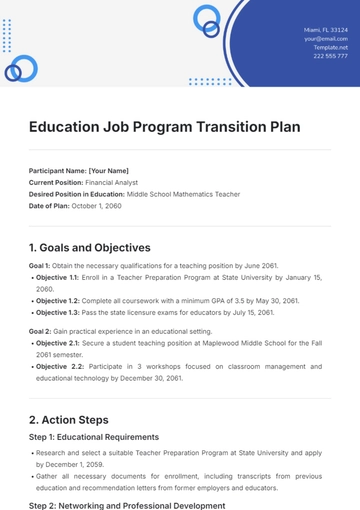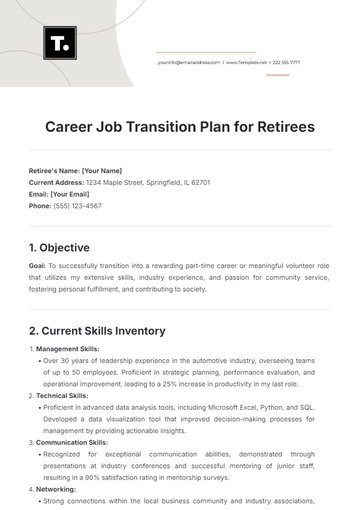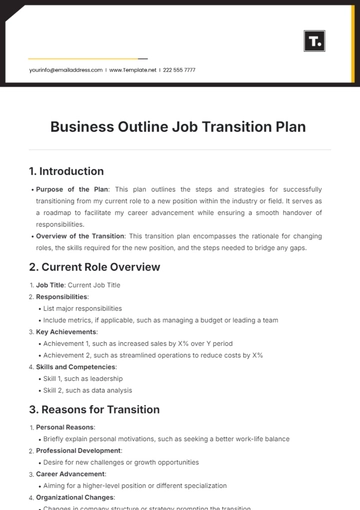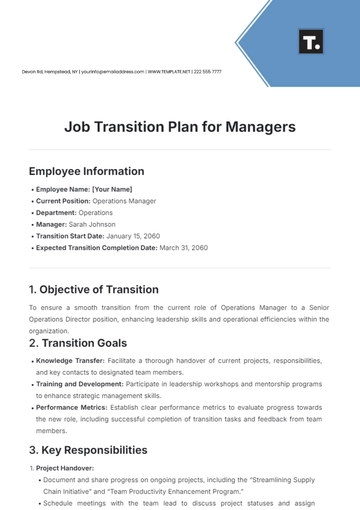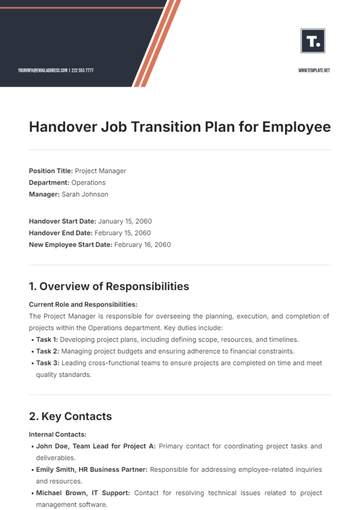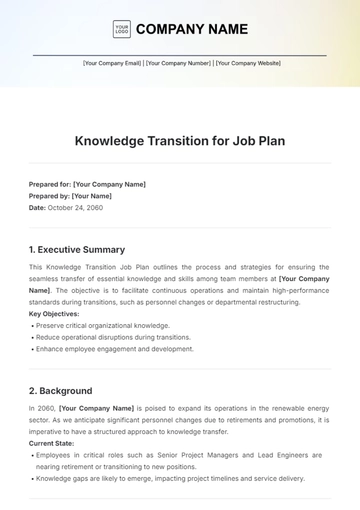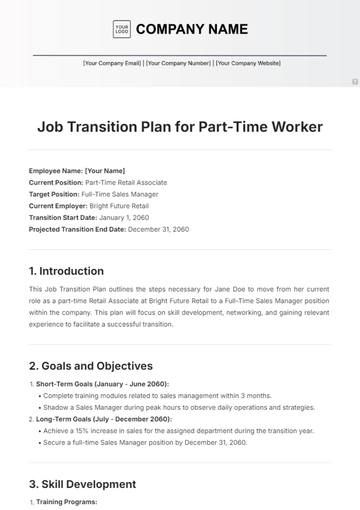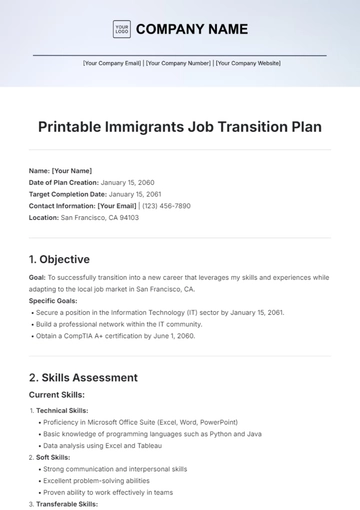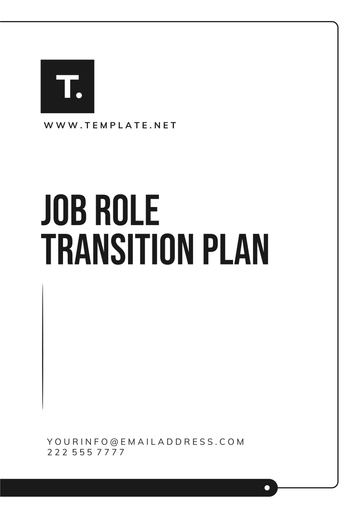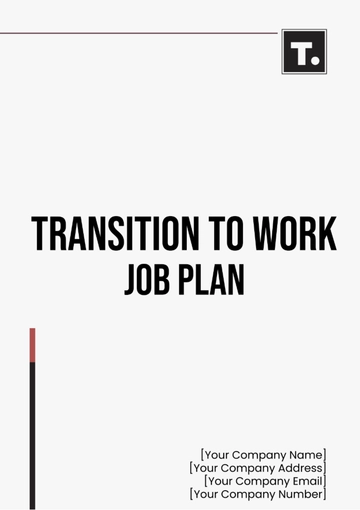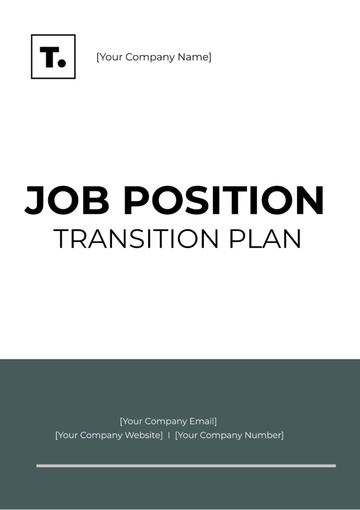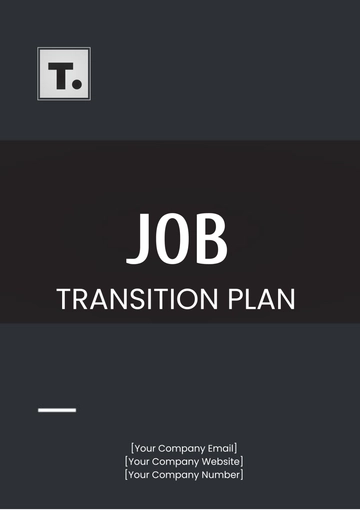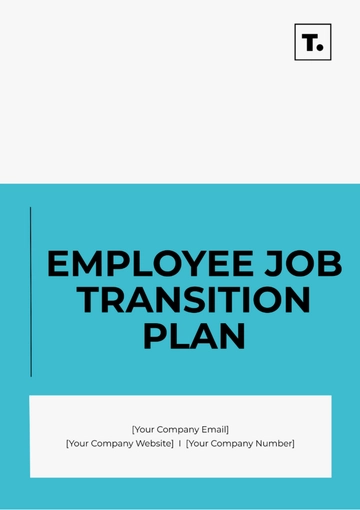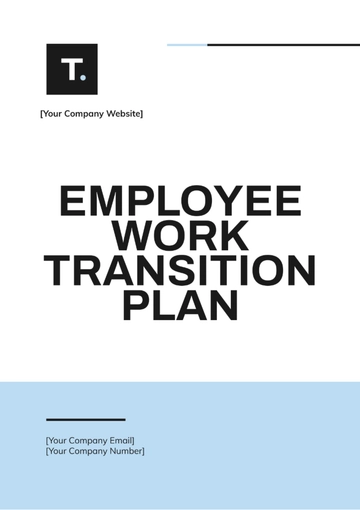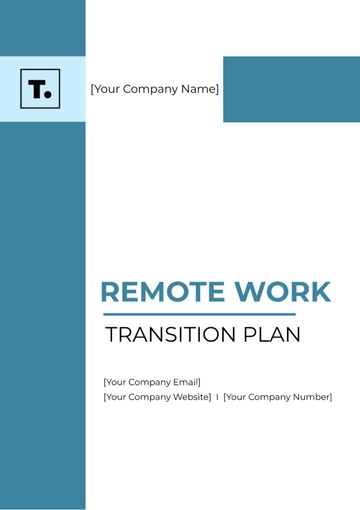Free Knowledge Transition for Job Plan
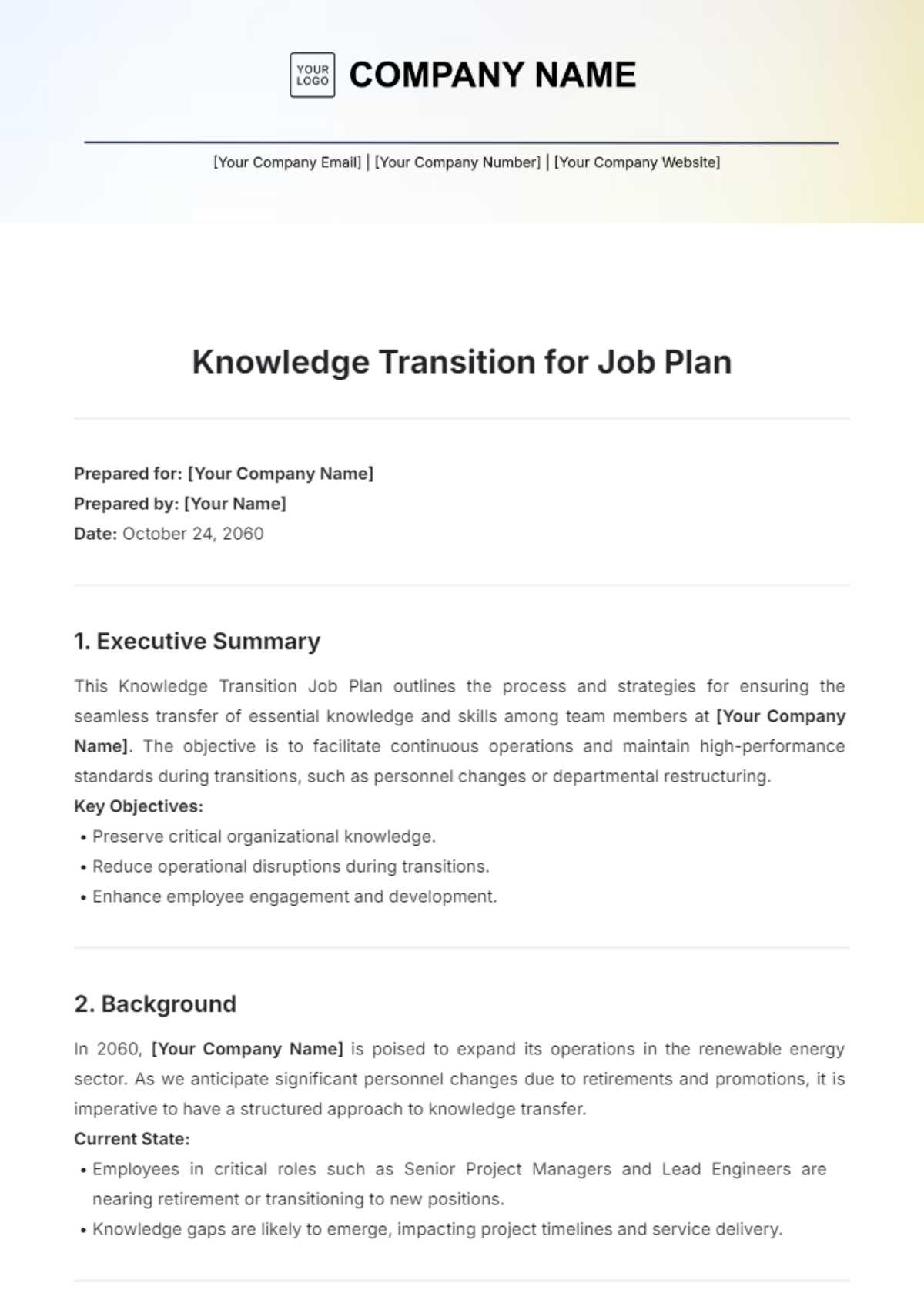
Prepared for: [Your Company Name]
Prepared by: [Your Name]
Date: October 24, 2060
1. Executive Summary
This Knowledge Transition Job Plan outlines the process and strategies for ensuring the seamless transfer of essential knowledge and skills among team members at [Your Company Name]. The objective is to facilitate continuous operations and maintain high-performance standards during transitions, such as personnel changes or departmental restructuring.
Key Objectives:
Preserve critical organizational knowledge.
Reduce operational disruptions during transitions.
Enhance employee engagement and development.
2. Background
In 2060, [Your Company Name] is poised to expand its operations in the renewable energy sector. As we anticipate significant personnel changes due to retirements and promotions, it is imperative to have a structured approach to knowledge transfer.
Current State:
Employees in critical roles such as Senior Project Managers and Lead Engineers are nearing retirement or transitioning to new positions.
Knowledge gaps are likely to emerge, impacting project timelines and service delivery.
3. Objectives
3.1 Primary Goals
Ensure all key processes are documented and accessible.
Train successors and new team members in essential skills and knowledge areas.
Foster a culture of knowledge sharing within the organization.
3.2 Specific Targets
Identify 100% of critical roles for knowledge transfer by January 31, 2060.
Achieve a 90% satisfaction rate in knowledge transfer sessions as measured by participant feedback by October 31, 2060.
4. Knowledge Inventory
4.1 Key Areas of Knowledge
Technical Skills: Proficiency in renewable energy systems, project management software (e.g., MS Project, Primavera), and data analysis tools (e.g., MATLAB, Python).
Process Knowledge: Key project management workflows, compliance, and regulatory procedures, and client engagement protocols.
Cultural Knowledge: [Your Company Name] values, mission, and best practices for teamwork and innovation.
4.2 Documentation
Develop a centralized knowledge repository by March 15, 2060, that includes:
Standard operating procedures (SOPs).
Best practices and lessons learned.
Training materials and resources.
5. Transition Strategy
5.1 Mentorship Program
Pair outgoing employees with successors for a minimum of three months to facilitate on-the-job training and guidance.
Implement regular check-ins and progress assessments.
5.2 Workshops and Training Sessions
Schedule training workshops focused on critical knowledge areas, starting from July 1, 2060, through September 30, 2060.
Create interactive training modules covering essential tools and processes.
5.3 Knowledge Transfer Tools
Utilize tools such as Learning Management Systems (LMS) and collaboration software (e.g., Slack, Microsoft Teams) to enhance accessibility and retention of knowledge.
Establish a forum for ongoing discussions and Q&A sessions post-transition.
6. Timeline
Activity | Start Date | End Date | Responsible Party |
|---|---|---|---|
Identify critical roles | January 1, 2060 | January 31, 2060 | Human Resources Team |
Develop knowledge repository | February 1, 2060 | March 15, 2060 | Knowledge Management Team |
Implement mentorship program | March 16, 2060 | June 30, 2060 | Operations Manager |
Conduct training sessions | July 1, 2060 | September 30, 2060 | Training Coordinator |
Gather feedback and assess success | October 1, 2060 | October 31, 2060 | HR Analytics Team |
7. Evaluation and Feedback
7.1 Assessment Metrics
Evaluate the effectiveness of knowledge transfer through surveys and performance metrics.
Use feedback to continuously improve training methods and documentation.
7.2 Follow-Up
Schedule quarterly reviews to ensure knowledge retention and identify any emerging gaps.
Adjust strategies as needed based on team feedback and organizational changes.
8. Conclusion
The Knowledge Transition Job Plan for [Your Company Name] is essential for maintaining our competitive edge and operational excellence in the evolving landscape of renewable energy. By implementing a structured approach to knowledge transfer, we aim to empower our workforce and secure the future success of our organization.
Prepared by:
 [Your Name]
[Your Name]
Knowledge Manager
- 100% Customizable, free editor
- Access 1 Million+ Templates, photo’s & graphics
- Download or share as a template
- Click and replace photos, graphics, text, backgrounds
- Resize, crop, AI write & more
- Access advanced editor
Facilitate effective knowledge transfer with the Knowledge Transition for Job Plan Template from Template.net. This editable and customizable template helps ensure critical information is passed smoothly between employees. Easily modify the content using our Ai Editor Tool to suit your organization's requirements. Enhance your transition processes and safeguard your team's knowledge!
You may also like
- Finance Plan
- Construction Plan
- Sales Plan
- Development Plan
- Career Plan
- Budget Plan
- HR Plan
- Education Plan
- Transition Plan
- Work Plan
- Training Plan
- Communication Plan
- Operation Plan
- Health And Safety Plan
- Strategy Plan
- Professional Development Plan
- Advertising Plan
- Risk Management Plan
- Restaurant Plan
- School Plan
- Nursing Home Patient Care Plan
- Nursing Care Plan
- Plan Event
- Startup Plan
- Social Media Plan
- Staffing Plan
- Annual Plan
- Content Plan
- Payment Plan
- Implementation Plan
- Hotel Plan
- Workout Plan
- Accounting Plan
- Campaign Plan
- Essay Plan
- 30 60 90 Day Plan
- Research Plan
- Recruitment Plan
- 90 Day Plan
- Quarterly Plan
- Emergency Plan
- 5 Year Plan
- Gym Plan
- Personal Plan
- IT and Software Plan
- Treatment Plan
- Real Estate Plan
- Law Firm Plan
- Healthcare Plan
- Improvement Plan
- Media Plan
- 5 Year Business Plan
- Learning Plan
- Marketing Campaign Plan
- Travel Agency Plan
- Cleaning Services Plan
- Interior Design Plan
- Performance Plan
- PR Plan
- Birth Plan
- Life Plan
- SEO Plan
- Disaster Recovery Plan
- Continuity Plan
- Launch Plan
- Legal Plan
- Behavior Plan
- Performance Improvement Plan
- Salon Plan
- Security Plan
- Security Management Plan
- Employee Development Plan
- Quality Plan
- Service Improvement Plan
- Growth Plan
- Incident Response Plan
- Basketball Plan
- Emergency Action Plan
- Product Launch Plan
- Spa Plan
- Employee Training Plan
- Data Analysis Plan
- Employee Action Plan
- Territory Plan
- Audit Plan
- Classroom Plan
- Activity Plan
- Parenting Plan
- Care Plan
- Project Execution Plan
- Exercise Plan
- Internship Plan
- Software Development Plan
- Continuous Improvement Plan
- Leave Plan
- 90 Day Sales Plan
- Advertising Agency Plan
- Employee Transition Plan
- Smart Action Plan
- Workplace Safety Plan
- Behavior Change Plan
- Contingency Plan
- Continuity of Operations Plan
- Health Plan
- Quality Control Plan
- Self Plan
- Sports Development Plan
- Change Management Plan
- Ecommerce Plan
- Personal Financial Plan
- Process Improvement Plan
- 30-60-90 Day Sales Plan
- Crisis Management Plan
- Engagement Plan
- Execution Plan
- Pandemic Plan
- Quality Assurance Plan
- Service Continuity Plan
- Agile Project Plan
- Fundraising Plan
- Job Transition Plan
- Asset Maintenance Plan
- Maintenance Plan
- Software Test Plan
- Staff Training and Development Plan
- 3 Year Plan
- Brand Activation Plan
- Release Plan
- Resource Plan
- Risk Mitigation Plan
- Teacher Plan
- 30 60 90 Day Plan for New Manager
- Food Safety Plan
- Food Truck Plan
- Hiring Plan
- Quality Management Plan
- Wellness Plan
- Behavior Intervention Plan
- Bonus Plan
- Investment Plan
- Maternity Leave Plan
- Pandemic Response Plan
- Succession Planning
- Coaching Plan
- Configuration Management Plan
- Remote Work Plan
- Self Care Plan
- Teaching Plan
- 100-Day Plan
- HACCP Plan
- Student Plan
- Sustainability Plan
- 30 60 90 Day Plan for Interview
- Access Plan
- Site Specific Safety Plan
